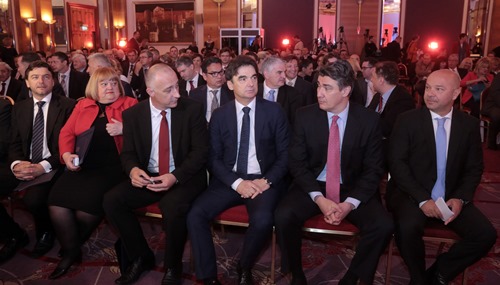- Published: 25.05.2015.
Government awards best investment projects
Dubrovacka Rivijera Hotels, the Pliva pharmaceutical company, the Podi Business Zone, and the Varazdin County physical planning and construction department are the winners of awards for the most successful investment projects, presented on Monday as part of the government's "Invest HR" conference. These projects prove that changes are indeed happening in terms of investments, government representatives said. About 40 major investment projects were presented at the conference which the state endorsed directly or through the Investment and Competitiveness Agency. Deputy Prime Minister Branko Grcic said current investments in Croatia were below HRK 70 billion annually, as against more than HRK 90 billion before the crisis, and that it was up to the government to additionally encourage them, especially foreign investments. He said tourism, industry and energy were the sectors with the biggest investment potential.
Dubrovacka Rivijera Hotels, the Pliva pharmaceutical company, the Podi Business Zone, and the Varazdin County physical planning and construction department are the winners of awards for the most successful investment projects, presented on Monday as part of the government's "Invest HR" conference. These projects prove that changes are indeed happening in terms of investments, government representatives said. About 40 major investment projects were presented at the conference which the state endorsed directly or through the Investment and Competitiveness Agency.

Deputy Prime Minister Branko Grcic said current investments in Croatia were below HRK 70 billion annually, as against more than HRK 90 billion before the crisis, and that it was up to the government to additionally encourage them, especially foreign investments. He said tourism, industry and energy were the sectors with the biggest investment potential.

Grcic gave the enterprise and investment climate in Croatia a vote of three on a scale of one to five, saying there were numerous segments which needed to make additional headway. He said the tax burden on businesses and citizens remained high and should be reduced "in parallel with reducing the excessive budgetary deficit, with fiscal consolidation and economic growth, of course, which is the key prerequisite for reducing the tax burden."
Economy Minister Ivan Vrdoljak said the assessments of the investment climate in Croatia were different and that no one could be sufficiently realistic. He said hundreds of good examples proved that a lot had been done over the past three years, but added that it could be done better and faster.
He was asked to comment on German weekly Bild am Sonntag's claim, citing a recent European Commission report, that the economic situation in Croatia had dramatically deteriorated and that, like Greece, it was facing bankruptcy.
Vrdoljak countered by asking if the World Bank was lying when it said that Croatia had made progress in the Doing Business rankings, or the Financial Times, when it said that now was the right opportunity to invest in Croatia.
Croatian Employers Association director general Davor Majetic said investments were certainly a good option, but warned that Croatia was still unpredictable and legally unsafe, which investors found very risky.
Scrapping projects such as the outsourcing of non-core public sector activities or the lease of motorways do not help Croatia's image, he said, also mentioning public disputes over oil exploration in the Adriatic Sea. Abandoning a project after a decision on it has been made is not a good signal to the investment community, he added.
Pliva CEO Mihael Furjan graded the investment and enterprise climate for the pharmaceutical industry with 4+ on a scale of 1 to 5. Over the past four years Pliva has invested more than HRK 1 billion, of which 10-15% in plants, four times more than the EU average.
(EUR 1 = HRK 7.5)
(Hina)
